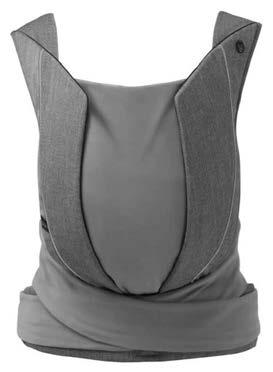9-12 MONTHS
FOCUS ON
Movement PL AY EXPERT AND CHILD PSYCHOLOGIST Emma Kenny EXPL AINS HOW TO NURTURE YOUR BABY ONCE SHE’S ON THE MOVE arents spend on average more than six hours a day holding their baby, so that incredible moment when your little bundle of joy begins to show a certain level of independence, whether that’s shuffling her bum along the floor or showing signs that she can travel by foot, marks huge milestones for both parent and child. Creating a happy environment for little ones to develop in is key, and allowing your baby to have fun within this environment is important, too. One of the main anxieties parents face is whether their little one is reaching their developmental milestones at the right time. I often remind parents that it’s important to see your child as the individual that she is. Each baby has a mind of their own, and more often than not, babies who don’t progress as quickly ultimately catch up in their own time, meaning you may be worrying unnecessarily, rather than just enjoying being a parent. Even if it turns out that your baby is experiencing some developmental delay, or health issues, you can’t let anxiety take hold. Instead, try to focus on positive strategies that will make you feel in control of your parenting and, more importantly, allow you to enjoy your baby for who she is. But from the first attempt at crawling, to those wobbles as she stands by herself, I’m a big believer in play being a crucial element of that development. Toys are, of course, an essential part of playtime, and well designed, safe, age-
P
114 | The Ultimate Baby Book 2021
appropriate toys can help baby along the way on so many levels. Play stimulates physical skills such as balance and coordination, and hand-eye coordination, and hones in on sensory skills, including perception of colours, form, movement and sound. And not forgetting the learning of social skills – interaction, taking turns, sharing and role play. But how will your little one change and develop from the age of nine to 12 months, and how can you help? There are many things parents can do to encourage more movement. Play games that boost your little one’s strength; these can begin as soon as your baby can sit unaided. Why not try stacking games, or even doing something as simple as rolling a ball out of her reach, so she starts increasing her core strength as she reaches to grab it, or crawl towards it? As soon as your baby starts pulling herself up, either using you or objects around her to stand with support, be sure to praise her. Lots of smiles and claps are great to encourage her to keep going. Babies love being rewarded and having lots of reinforcing stimuli such as musical sounds and peek-a-boo mirrors makes their playtime fun, while observing a whole host of positive developmental opportunities. A baby walker will give her a sense of independence, and this will also help to strengthen her leg muscles as she becomes more confident. Be a support for your little one; walk with her by standing behind and gently holding her
MARKING THOSE MONTHLY MILESTONES Here’s a guide to where your little one may find herself over the next few months (but remember, all babies are different!)
Month 9 • Using her good vision to see where she wants to go • Recognising familiar people • Independently choosing what she wants to play with
Month 10 • Understanding the meaning of basic words such as ‘no’ and ‘yes’ • Cruising around a room • Singling out her favourite toys for maximum fun
Month 11 • Standing independently • Taking her first step • Widening her speech and language
Month 12 • Chatting • Walking or cruising • Playing with some independence















